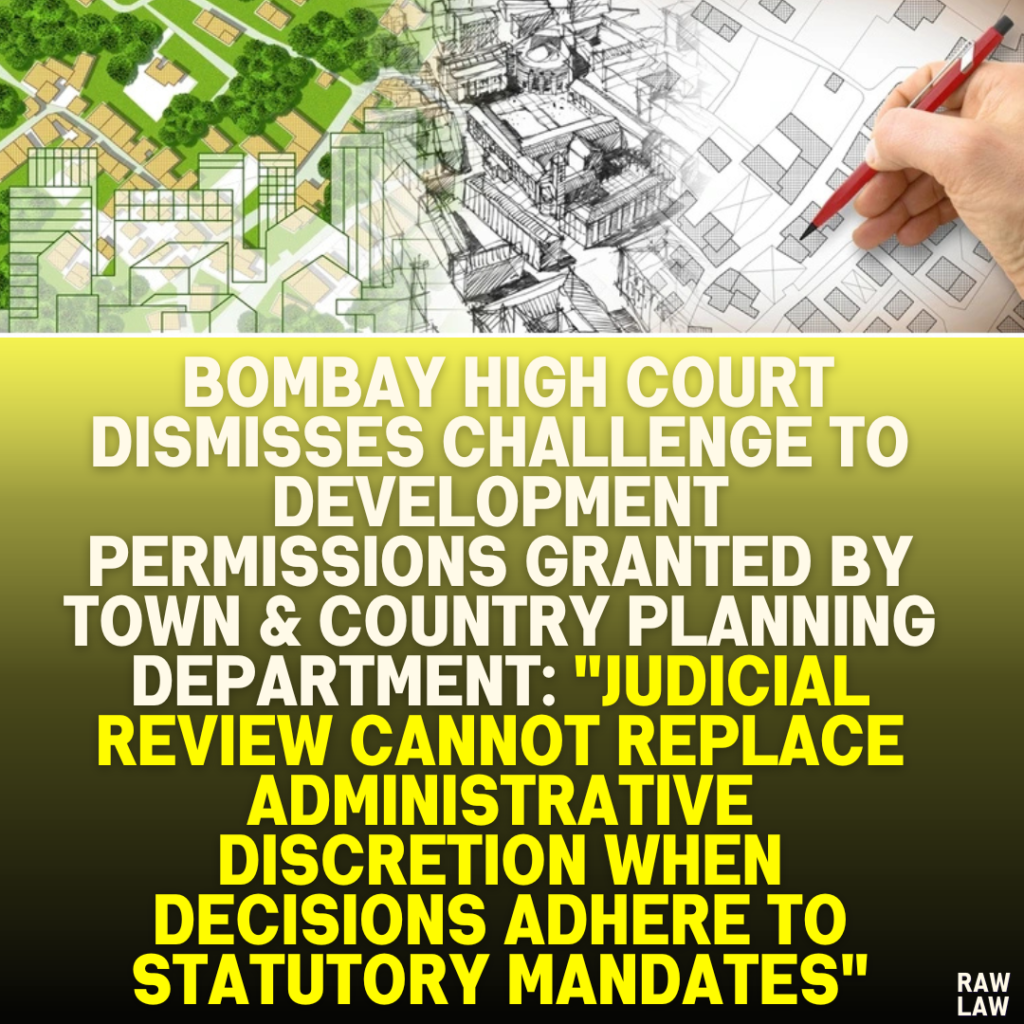Court’s Decision:
The Bombay High Court dismissed the writ petition filed against the Town & Country Planning Department. It held that the department’s decisions were in compliance with statutory procedures and did not warrant judicial interference. The court clarified that the scope of judicial review in administrative matters is limited to ensuring that decisions comply with legal mandates and are free from arbitrariness.
Facts:
- Background: The case arose from challenges to the actions of the Town & Country Planning Department of Goa, specifically regarding approvals granted for certain land development projects.
- Petitioners’ Concerns: Several residents alleged that these approvals violated statutory provisions of the regional development plan and were granted arbitrarily. They contended that the permissions caused environmental and social harm, undermining sustainable development objectives.
- Administrative Process: The department had evaluated and granted permissions under the Town and Country Planning Act, but the petitioners questioned the validity of these approvals on the grounds of procedural lapses.
Issues:
- Did the Town & Country Planning Department adhere to the statutory and procedural requirements while granting development permissions?
- Were the petitioners’ allegations of arbitrary and illegal actions by the respondents valid and supported by evidence?
Petitioner’s Arguments:
- Non-Compliance Alleged: The petitioners argued that the respondents failed to comply with the mandatory statutory provisions laid down in the Town and Country Planning Act.
- Environmental Concerns: They claimed that the permissions granted adversely impacted the environment and local communities.
- Procedural Irregularities: They alleged that the department had ignored objections and failed to follow principles of natural justice.
- Arbitrariness: The petitioners contended that the permissions were granted in a non-transparent and arbitrary manner.
Respondent’s Arguments:
- Procedural Compliance: The respondents asserted that all permissions were granted strictly following the law and the applicable regional plan.
- Public Interest: They maintained that the decisions were taken in the larger public interest and were supported by sound administrative discretion.
- Challenge Without Basis: They argued that the petitioners failed to provide substantive evidence to support their allegations of illegality or arbitrariness.
Analysis of the Law:
- Statutory Framework: The court examined the provisions of the Town and Country Planning Act, which governs the process for granting development permissions. It emphasized the importance of adhering to these statutory mandates.
- Judicial Review: The court reiterated that judicial intervention is limited to instances where administrative decisions are shown to be arbitrary, capricious, or contrary to law. Courts should not act as appellate authorities to reassess administrative discretion.
- Principles of Natural Justice: The court analyzed whether the decision-making process violated principles of natural justice and concluded that there was no evidence of such violations.
Precedent Analysis:
The court relied on these precedents to guide its decision:
- AIR 2010 SC 2794: This case emphasized that judicial review in administrative matters is confined to examining legality and procedural propriety, not the merits of the decision.
- AIR 1990 SC 461: It underlined the importance of adhering to statutory procedures in administrative functions.
- 2013 (2) ABR 208: This case highlighted that mere allegations of bias or arbitrariness without concrete evidence are insufficient grounds for judicial interference.
Court’s Reasoning:
- No Substantive Violations: The court found no evidence of procedural lapses or violations of statutory provisions by the respondents.
- Adherence to Law: It observed that the permissions were granted after following due procedures and were consistent with the applicable regional plan.
- Limits of Judicial Review: The court emphasized, “Judicial intervention cannot replace administrative discretion unless decisions are contrary to the law or established norms.” It reiterated that courts cannot act as decision-makers in administrative matters unless clear illegality is established.
- Burden of Proof: The court held that the petitioners failed to discharge the burden of proof to demonstrate any irregularities or illegality in the respondents’ actions.
Conclusion:
The writ petition was dismissed, with the court affirming that the Town & Country Planning Department acted within its statutory authority. The court highlighted that administrative decisions, when backed by evidence of compliance with statutory mandates, are presumed valid unless proved otherwise.
Implications:
- Reaffirming Administrative Authority: The judgment reinforces the principle that courts will not interfere with administrative decisions unless there is a clear violation of statutory or constitutional principles.
- Strengthening Procedural Compliance: It underscores the importance of adherence to statutory requirements by administrative authorities to ensure their decisions withstand judicial scrutiny.
- Limited Judicial Review: This decision sets a precedent that courts should not overreach into administrative domains unless decisions are arbitrary or illegal.




Pingback: Delhi High Court Sets Aside Unreasoned Trial Court Order; Remands Case for Fresh Hearing in Trademark Dispute, Emphasizing the Need for Reasoned Judicial Decisions - Raw Law
Pingback: Supreme Court Upholds Municipal Corporation’s Authority in Waste-to-Energy Projects: Reinstates DERC Tariff Approval and Emphasizes Public Interest in Environmental Sustainability - Raw Law